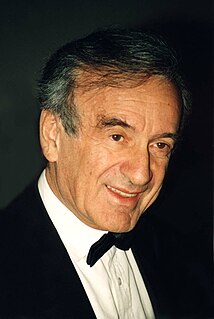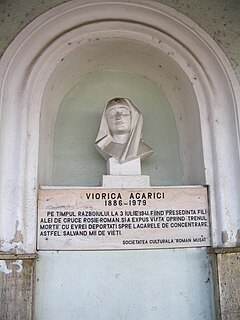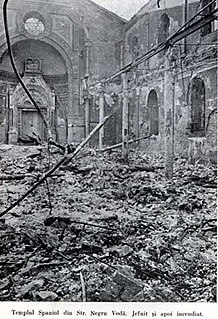
Elie Wiesel was a Romanian-born American writer, professor, political activist, Nobel laureate, and Holocaust survivor. He authored 57 books, written mostly in French and English, including Night, a work based on his experiences as a Jewish prisoner in the Auschwitz and Buchenwald concentration camps.

Ion Antonescu was a Romanian military officer and marshal who presided over two successive wartime dictatorships as Prime Minister and Conducător during most of World War II. After the war, he was executed.
Following the outbreak of World War II on 1 September 1939, the Kingdom of Romania under King Carol II officially adopted a position of neutrality. However, the rapidly changing situation in Europe during 1940, as well as domestic political upheaval, undermined this stance. Fascist political forces such as the Iron Guard rose in popularity and power, urging an alliance with Nazi Germany and its allies. As the military fortunes of Romania's two main guarantors of territorial integrity—France and Britain—crumbled in the Fall of France, the government of Romania turned to Germany in hopes of a similar guarantee, unaware that the then dominant European power had already granted its consent to Soviet territorial claims in a secret protocol of 1939's Molotov–Ribbentrop Pact.

The Iron Guard was a fascist movement and political party in Romania founded in 1927 by Corneliu Zelea Codreanu as the Legion of the Archangel Michael or the Legionnaire Movement. Its ideology was ultra-nationalistic, antisemitic, and opposed to both communism and capitalism; it also promoted its own radicalized version of Eastern Orthodox Christianity.

The Social Democratic Party is the major social-democratic political party in Romania founded by Ion Iliescu, Romania's first democratically elected president. The largest party in Parliament with initially 47 seats in the Senate and 110 seats in the Chamber of Deputies, it also has the largest number of mayors, local and county councilors and county presidents thus being the biggest and most influential political force in the country.

The Iași pogrom was a series of pogroms launched by governmental forces under Marshal Ion Antonescu in the Romanian city of Iași against its Jewish community, which lasted from 29 June to 6 July 1941. According to Romanian authorities, over 13,266 people, or one third of the Jewish population, were massacred in the pogrom itself or in its aftermath, and many were deported.
Alex Mihai Stoenescu is a Romanian historian, writer, journalist and politician.
The history of the Jews in Romania concerns the Jews both of Romania and of Romanian origins, from their first mention on what is present-day Romanian territory. Minimal until the 18th century, the size of the Jewish population increased after around 1850, and more especially after the establishment of Greater Romania in the aftermath of World War I. A diverse community, albeit an overwhelmingly urban one, Jews were a target of religious persecution and racism in Romanian society – from the late-19th century debate over the "Jewish Question" and the Jewish residents' right to citizenship, to the genocide carried out in the lands of Romania as part of the Holocaust. The latter, coupled with successive waves of aliyah, has accounted for a dramatic decrease in the overall size of Romania's present-day Jewish community.
The two Romanian People's Tribunals, the Bucharest People's Tribunal and the Northern Transylvania People's Tribunal were set up by the post-World War II government of Romania, overseen by the Allied Control Commission to try suspected war criminals, in line with Article 14 of the Armistice Agreement with Romania which said: "The Romanian Government and High Command undertake to collaborate with the Allied (Soviet) High Command in the apprehension and trial of persons accused of war crimes".

Viorica Agarici (1886–1979) was a Romanian nurse, the chairwoman of the local Red Cross in the city of Roman during World War II and the Ion Antonescu regime. A protector of the Jewish population during the implementation of the Holocaust in Romania, she is one of the Romanians among the Righteous Among the Nations commemorated by the Israeli people at Yad Vashem.

Between 21 and 23 January 1941, a rebellion of the Iron Guard paramilitary organization, whose members were known as Legionnaires, occurred in Bucharest, Romania. As their privileges were being gradually removed by the Conducător Ion Antonescu, the Legionnaires revolted. During the rebellion and subsequent pogrom, the Iron Guard killed 125 Jews, and 30 soldiers died in the confrontation with the rebels. Following this, the Iron Guard movement was banned and 9,000 of its members were imprisoned.
The National Day of Commemorating the Holocaust is a national event held on October 9 in Romania. It is dedicated to the remembrance of the victims of the Holocaust and particularly to reflecting on Romania's role in the Holocaust. Various commemoration events and ceremonies take place throughout Romania in order to remember the Jews and Romani who died in the Holocaust.
The Elie Wiesel National Institute for Studying the Holocaust in Romania, Institutul Naţional pentru Studierea Holocaustului din România „Elie Wiesel” in Romanian) is a public institution established by the Romanian government on August 7, 2005, and officially opened on October 9 of the same year, which is Romania's National Day of Commemorating the Holocaust.

On 1 July 1940, in the town of Dorohoi in Romania, Romanian military units carried out a pogrom against the local Jews, during which, according to an official Romanian report, 53 Jews were murdered, and dozens injured. According to the town's Jews, the number of fatalities was between 165 and 200. These acts were committed before Romania entered World War II, before it became Germany's ally, and before the German military entered the country.

Corpul Muncitoresc Legionar or Corpul Muncitorilor Legionari was a fascist association of workers in Romania, created inside the Iron Guard and having a rigid hierarchical structure. From its creation until September 1940, the CML was led by Gheorghe Clime; afterwards, the position was filled by Dumitru Groza, who oversaw the Corps during the period when the Iron Guard was in power — the National Legionary State —, and involved it in the 1941 Rebellion and Pogrom. The CML had its headquarters in Bucharest, on Calea Călăraşilor.

The Northern Transylvania Holocaust Memorial Museum is located in Șimleu Silvaniei, Sălaj County, Romania and was opened September 11, 2005. The museum is operated and maintained by the Jewish Architectural Heritage Foundation of New York and Asociația Memoraliă Hebraică Nușfalău, with the support of the Claims Conference, Elie Wiesel National Institute for Studying the Holocaust in Romania, among other philanthropic and pedagogical partners.

The Jewish Architectural Heritage Foundation is a non-profit, Staten Island, New York-based corporation which assumes responsibility for maintaining, restoring, renovating and building Jewish heritage buildings and monuments on a global scale. It has 501(c)(3) tax-exempt status.
Jean Ancel was a Romanian-born Israeli author and historian; with specialty in the history of the Jews in Romania between the two World wars, and the Holocaust of the Jews of Romania.
Freedom of religion in Romania refers to the extent to which people in Romania are freely able to practice their religious beliefs, taking into account both government policies and societal attitudes toward religious groups.
Sigmund Strochlitz was a Polish-born Jewish American entrepreneur, political activist, and Holocaust survivor. He served on the U.S. President's Commission on the Holocaust and the U.S. Holocaust Memorial Council from 1978 to 1986, establishing the United States Holocaust Memorial Museum. Strochlitz was the first chair of the council's Days of Remembrance committee, persuading state and federal officials to hold annual Holocaust commemorations in all fifty state capitals and in Washington, D.C. in 1985 and every year since. According to the Encyclopedia Judaica, Strochlitz was a "major figure in institutionalizing Holocaust commemoration" throughout the United States.










